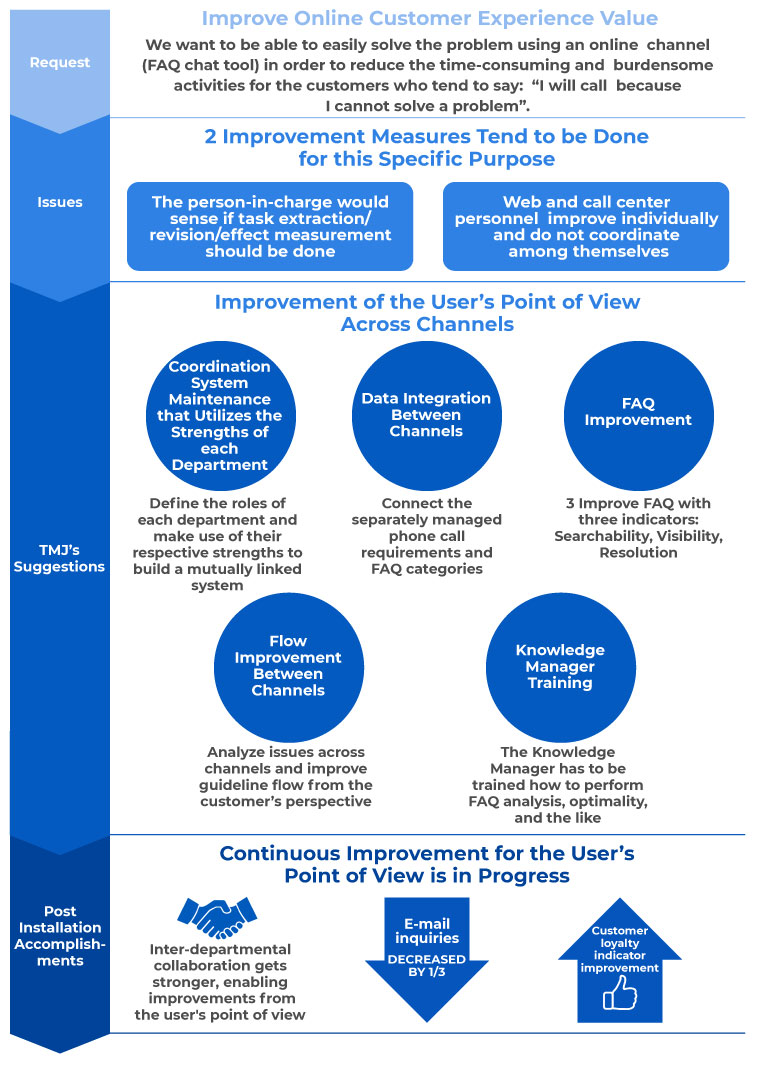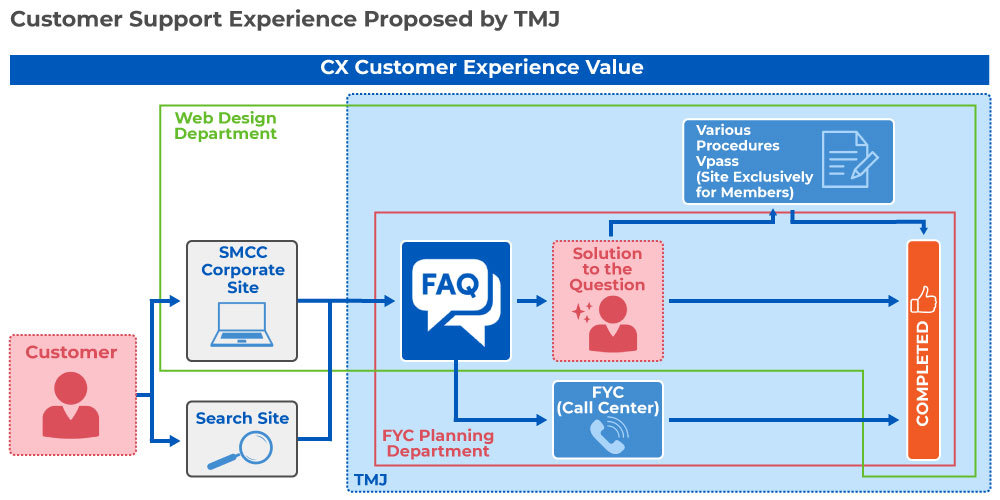Transforming CX through Integration, Data, and Continuous Improvement
- Home
- Insights
- Case Studies
- Financial Services
- Transforming CX through Integration, Data, and Continuous Improvement

Sumitomo Mitsui Card Co., Ltd., a major credit card company in Japan, has been at the forefront of the industry since issuing Japan’s first Visa card in 1967.
Further reinforcing its strong commitment to a “customer first” philosophy, the company has been focusing on continuous improvement of its customer service.
Sumitomo Mitsui Card forged a successful partnership with TMJ to integrate and enhance their web and phone channels, with the aim of providing a more seamless and satisfying customer experience.
The Challenge
Sumitomo Mitsui Card faced a number of unique challenges:
- Siloed Departments: The marketing, web, and call center divisions operated independently, leading to inconsistent customer experiences across channels.
- Self-Service Limitations: Customers faced difficulties solving their own problems through the existing self-service options.
- Disconnected Improvement Efforts: Web and call center teams worked on improvements separately without a unified strategy.
- Lack of Data Integration: Customer interaction data from different channels was not analyzed holistically.
- Unclear Customer Needs: The company was struggling to define what “customer-friendly” truly meant in practice.
This fragmented approach to customer service improvements, combined with a lack of cross-channel data analysis, was hindering Sumitomo Mitsui Card’s ability to provide a truly customer-centric experience.
The Solution
TMJ worked with Sumitomo Mitsui Cards to improve customer experience across the board:
1. Cross-Departmental Integration:
Following input from TMJ, a reorganization was undertaken to more closely integrate the marketing division (which knows the customers) with the web and call center functions (which are responsible for conveying information to customers). This integration aimed to improve communication and create a more cohesive customer experience.
The role of each department was also clearly defined:
- The Web Design Department took charge of improving data linking from each channel to better understand customer behavior.
- The Call Center Planning Department, with its close relations with customers, took responsibility for FAQ content improvement.
2. Data Linking and Analysis:
TMJ helped the Web Design Department implement a system to link and analyze data across different contact channels, including website access logs, FAQ usage, and telephone inquiry content. This holistic approach provided valuable insights into customer behavior and pain points across all channels.
3. FAQ Optimization:
TMJ helped guide the improvement of FAQs from three perspectives:
- Searchability: Ensuring customers could find the answers they were looking for.
- Visibility: Making sure the relevant content was easily visible.
- Resolution: Confirming that the provided information solved the customer’s problem.

4. Customer Behavior Analysis:
TMJ assisted in analyzing customer actions after viewing FAQs, recognizing that different FAQ content might lead to different desired actions (e.g., problem resolution, proceeding to a specific procedure).
6. Lead Improvement:
TMJ helped enhance entry points to the FAQ site and improve its functionality. This included optimizing frequently searched keywords and improving the design and layout of search results.

7. Establishment of a Knowledge Manager:
A dedicated role of Knowledge Manager was created within the Call Center Planning Department to oversee ongoing FAQ improvements.
8. PDCA Cycle Implementation:
TMJ supported the implementation of a Plan-Do-Check-Act cycle for continuous improvement, including how to extract problems, design and plan improvements, and analyze results.
“Analyzing how customers discovered FAQs, how they searched them, what information they read, what the resolution, and what action they took afterwards all helped uncover lots we didn’t know about customer behavior and expectations. Now we can more quickly identify new issues and identify opportunities for continuous improvement.”
– Call Center Planning Department Representative, Sumitomo Mitsui Card Co., Ltd.
Results
The collaboration between Sumitomo Mitsui Card and TMJ yielded significant improvements in customer experience and operational efficiency, demonstrating the tangible benefits of the initiative:
- Improved Customer Loyalty: The company observed an increase in its Net Promoter Score (NPS), which indicates higher customer satisfaction and loyalty.
- Reduced Email Inquiries: Email inquiries were reduced to one-third of their previous volume, demonstrating the effectiveness of the improved self-service options.
- Enhanced FAQ Effectiveness: The company saw an increase in successful query resolutions through its FAQ system.
- Improved Cross-Channel Consistency: By integrating data and strategies across web and phone channels, customers experienced more consistent service regardless of their contact method.
- Efficient Resource Allocation: With more customers finding answers through self-service options, call center resources could be allocated more effectively to handle complex inquiries.
- Data-driven decision-making: The new data linking and analysis processes allowed for more informed, customer-centric decision-making across departments.

Sumitomo Mitsui Card’s partnership with TMJ has significantly transformed its customer service approach. By breaking down silos between departments, integrating data across channels, and focusing on customer-centric improvements, the company has created a strong foundation for delivering exceptional customer experiences.
“Up until now, each department has been thinking, ‘How should we improve the contact channel we are in charge of?’, yet our viewpoint changed to ‘What kind of customer support is needed to provide our customers with a pleasant experience?’ I feel it is now possible to improve the customer-first philosophy optimally based on the correct task settings.”
– Takeshi Okada, Web Design Department Director, Sumitomo Mitsui Card Co., Ltd.
This case study demonstrates TMJ’s expertise in guiding companies through complex, cross-channel improvement initiatives, ultimately leading to measurable customer satisfaction and operational efficiency benefits.
Related Insights
Expand Your Business in Japan Today!
Unlock growth opportunities in the Japanese market with our expert support. Contact us to explore how we can help you succeed.





